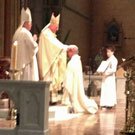‘Sir, will there be only a few saved?’ So starts this Sunday’s Gospel. This question has been repeated and pondered by theologians ever since.
The late Cardinal Dulles provides a good rundown of the historical debate. In a nutshell, many saints, mystics and theologians lament that most of us are bound for Hell. And many other saints, mystics and theologians speculate that God is so irresistibly attractive that even the most evil people eventually repent and Hell’s population is negligible.
Given all the ink spilled contemplating the question, you’d think Our Lord could have replied more directly. ‘Will only a few be saved?’ demands a single world answer. Yes or no. But our Lord is not so obliging:
Try your best to enter by the narrow door, because, I tell you, many will try to enter and will not succeed. (Lk 13:24)
In other words: “That’s not a good question. Here’s the answer to the question you should have asked — ie: ‘how are we saved?'”
I think I can see why our Lord replied this way. Pondering the populations of Hell and Heaven isn’t much better than spiritual naval-gazing. As soon as we are focused on the number of the elect, we have lost our focus on the task at hand: getting souls to Heaven. sharing in Christ’s redemptive mission.* It’s the sort of self-reference which Cardinal Bergoglio warned against in the speech he delivered before he was duly elected pope:
When the Church does not come out of herself to evangelize, she becomes self-referential and then gets sick . . .
When the Church is inadvertently self-referential, she believes she has her own light; she ceases to be the mysterium lunae and gives way to that very serious evil, spiritual worldliness . . .
Put simply, there are two images of the Church: the evangelising Church who comes out of herself, the Dei Verbum religiose audiens et fidente proclamans; and the worldly Church, living within herself, of herself, for herself.
Of course the future pope was referring to the Church at large. But often enough, what is true of the Church at large is also true of each us, personally and individually. So, to be an authentic Christian — to be apostolic — we must “hear the word of God with reverence and proclaim it in faith.”
In view of the Sunday Gospel, what does it mean, to “enter by the narrow door?” Elsewhere, our Lord insists:
I am the door. Anyone who enters through me will be saved. (Jn 10:9.)
To be saved, we must conform to Jesus Christ. That might sound self-referential, but it is — paradoxically — the very opposite. To conform ourselves to Christ, we must love as our Lord loves — madly, indiscriminately, forgetting ourselves.
Loving like Christ is costly. Hence, ‘many try and do not succeed.’ It requires us to embrace the cross, which is the only place such love can lead us. If we dare to love like Jesus, we will be hurt like Jesus.
Loving this way — living this way — is the very antithesis of self-reference.
This is something I’ve got to work on this. Please God, my lifetime is time enough!
* Revised. (See comments.)






I appreciate the sentiment, Father, but “getting souls to heaven” is not a sufficient way of expressing the mission of the Church or the purpose of the Gospel, either in terms of scriptural or patristic theology, or in terms of good catechesis (I suggest a retreading of the Catechism of the Catholic Church, especially in regard to the New Heavens and the New Earth, and perhaps Spe Salvi or Ratzinger’s Eschatology or even Tom Wright’s Surprised by Hope). I would suggest speaking about the Life of the Age to Come, as the creeds do, or about entering fully into the life and communion of the Blessed Trinity, or even the Beatific Vision or the Wedding Feast of The Lamb – but please nothing as unconnected to the NT Gospel as “getting souls to heaven”.
Fair point. Not the best choice of words: inadequate perhaps, though not misleading. In any event, since the point is the Church’s mission, I’ve put the focus more squarely on that. Thanks Schutz!
With all due respect to Mr Schultz the avoidance of talking about getting souls to heaven is just political correctness gone mad. The Compendium of the Catechism does in fact talk about man’s end being to be lifted up to life with God in heaven (Qu 66). That is entirely consistent with the tradition of the Church and talking about getting souls to heaven is entirely consistent with the tradition of the Church and magisterial terminology.
And too, the consequences for the Churches mission of shying away from the dominant view of the tradition, namely that many are not saved, have been well documented in Ralph Martin’s excellent new book, Will many be saved?
Yes, we certainly need to focus on the how. But we also need to be motivated by the imperative of saving souls.
Ralph Martin’s Will many be saved? has been recommended to me so many times in the last few weeks that I can ignore it no longer. I just placed my order!
“sharing in Christ’s redemptive mission” vs “getting souls to heaven”
Which is understandable to the layman? Which isn’t? (no prizes for guesssing, sorry) And besides, getting souls to heaven IS a mission–it’s Christ’s number one mission.
Pope Francis warned against psuedo-intellectual language and I loved the way he put it “NO ONE CAN UNDERSTAND YOU!!!!!!” (capitals and exclamation marks all mine 🙂
Powerful post, Fr John – thank you for that. You incorporate the major elements of becoming an evangelist; not an intellectual exercise (although study of our faith is vital) but allowing ourselves to be stretched out – open and at risk – on the cross of self-sacrifice.
We can accept Christ because we know He has given His utter all for each of us. For others to accept the message through us, we have to convince them by our love that we are prepared to do the same for them.
A big, tough ask. Olympian spiritual fitness program. I spose this is why we are exhorted to aspire to holiness – not just to save our own souls but to attract others to accompany us on the pilgrimage to heaven.
Do you think if we don’t become holy enough to inspire at least one other pilgrim to take up the cross, then we are unlikely to make the grade ourselves?
I’ve just tried to get it across to a young person that his anxiety attacks could be the result of depending on the world, the flesh and the devil for security instead of on God. That anxiety and panic attacks are a rational consequence to having nothing more than yourself to believe in, in a scary, chaotic world. The reaction wasn’t promising – a snort of derision about ‘talking religion’. Perhaps a few periods of prayer and fasting would have a better effect!
Thanks MuMu.
Interesting question, re: bringing others into Heaven with us. I’m hesitant though. None of us earn Heaven, and ultimately, it’s our Lord alone who can inspire anyone to accept his mercy and redemption. Which does not absolve at all our obligation to be “co-redeemers.” Tricky stuff!
I have suffered anxiety. I think if I had been more supernaturally-minded, if prayer had been my first resort, perhaps my symptoms would have been alleviated. But I don’t think faith or even holiness immunises us from mental illness. Many saints were afflicted with mental illness, which only served to sanctify them. Such is the mystery of redemptive suffering!
Your final remarks are very true. I’m reminded of that point in The Way, which perhaps you had in mind yourself:
To help save souls, embrace the trials and hardships we have in life, pick up our cross and follow Him. lead by example, it often says more than words.
“preach the Gospel at all times, and when necessary use words”
St Francis of Assisi
that’s it. Cathy.Mother Teresa made people weep by her very presence and all the while she was feeling nothing but utter desolation. She was so Christlike. What an inspiration.
Embracing the cross seems to be the secret. St Josemaria says “When you love the cross, it ceases to become the cross.”
Fr John, it is a comfort, late on Sunday night, returning home from Sunday evening Mass 100kms from home, to see that the Holy Spirit has been at work in both our lives as we have ministered to our people. Your blog has confirmed that what I have said in the homilies this weekend is indeed an offering of comfort and consolation, of challenge and guidance, not of my own composition, but of God’s desire to reach out to all of us. It’s a beautiful, but also a terrible thought, that God can use us sinners to sing harmoniously of his desire that his Christ’s Church be the ‘narrow door’ for all to be invited through, to know that which is entirely beyond our manufacture, eternal life. Thank you for the opportunity too, as a priest in an isolated area, to know that I have been of service to the Master this weekend, by knowing that somehow, not by my own doing, but entirely by Grace, that I have echoed that which was His desire, the words of comfort, consolation and challenge be delivered to his people everywhere.
Wow. That is pretty cool. Deo gratias.